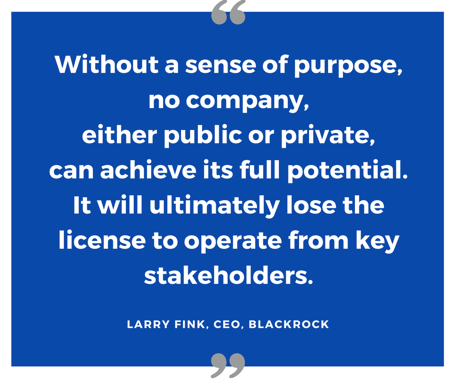Last month, Larry Fink, the CEO of BlackRock, the nation’s largest asset manager, wrote in his annual letter to CEOs:
To prosper over time, every company must not only deliver financial performance, but also show how it makes a positive contribution to society. Companies must benefit all of their stakeholders, including shareholders, employees, customers, and the communities in which they operate. Without a sense of purpose, no company, either public or private, can achieve its full potential. It will ultimately lose the license to operate from key stakeholders. It will succumb to short-term pressures to distribute earnings, and, in the process, sacrifice investments in employee development, innovation, and capital expenditures that are necessary for long-term growth. It will remain exposed to activist campaigns that articulate a clearer goal, even if that goal serves only the shortest and narrowest of objectives. And ultimately, that company will provide subpar returns to the investors who depend on it to finance their retirement, home purchases, or higher education.
Fink’s argument that a social purpose was good for the corporate bottom line has attracted scrutiny from researchers as well as the media. A few recent studies illustrate the scope of this debate:
Researchers at the University of California San Francisco studied African media coverage of tobacco companies’ corporate social responsibility initiatives. Of the 288 news items they found, the majority relied solely on tobacco industry representatives as news sources, and portrayed tobacco industry CSR positively. When public health voices and tobacco control themes were included, news items were less likely to have a positive slant. They concluded that their finding suggests a foundation on which to build media advocacy efforts. Drawing links between implementing the Framework Convention on Tobacco Control and prohibiting or curtailing tobacco industry CSR programs may result in more public dialogue in the media about the negative impacts of tobacco company CSR initiatives.
In Science, a research team based at City University of New York describes a study that an asset owner, an asset manager, and two research universities are designing. They are developing a next generation of traceable indicators to quantify external context and impact of investments on the environment and health and place these into a decision-making framework useful to investors. Tests of these science-based sustainability metrics are under way on a $2.1 billion portfolio of public equities invested on behalf of a large European pension fund.
Another study compared the appeal of a fast food company’s public health related corporate social responsibility message with a more generic social issue-related message. The generic message elicited significantly more positive perceptions of CSR motives, supportive communication intent and investment intent than public-health related CSR. However, when a company has a healthier image, stakeholders do not distinguish between health-related and other types of CSR messages. Researchers also found that positively perceived CSR motive plays a determinant role in anticipating communication, investment, and purchase- intents, reinforcing Fink’s message that at least perceived CSR can contribute to the bottom line.
